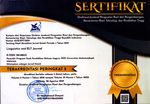Using of “I Love You 3000” Song in Pandemic Era in Teaching English at Mining Department of Engineering Faculty
Abstract
Vocabulary is one of the English components or sub-skill that must be taught to the students. The vocabulary has the role to develop the four language skills, they are listening, reading, writing and speaking. Many vocabularies that the students have, is the easier for them to develop it, especially in the pandemic era because of COVID-19, the teacher have to use a media like an English song to enrich the students at Mining Department of Engineering Faculty vocabularies. In order that, the purpose of this study was to investigate the use of song as a media whether it is effective or not in teaching vocabulary. The total population of this study involved 92 students but the sample of by using the purposive technique sampling got 20 students in A class as a control and 20 students at B for experimental class. The instrument of this study used multiple choice tests which consist of 20 items. The data was collected by using pre-test and post-test, then followed by analyzing the data based on Arikunto’s theory using descriptive design. As well as the manual computation the result also showed that the score of the t-test was 4.741. The researcher compare that t-table at the degrees of freedom (df) (Nx + Ny)-2 . df = 20 + 20 – 2 = 38. The degree of freedom of 38 is at the competence interval of 0.05 (95%) is 2.024 and 0.01 (99%) is 2.711. the comparison is done between t-test formulated with t-table in which results is 4.741 it is to found that the t-table of “t” indicated: t-test 4.741 > t-table. It means that the mean score of the experimental class was higher than control class. So, the researcher concluded that the use of song “I Love You 3000” is effective in teaching learning English at Mining Department in academic year 2018/2019 and it means that the use of song as an alternative hypothesis (Ha) is accepted.
Keywords
Full Text:
PDFReferences
Anna Kuisnerek. 2016. A Thesis: The Role of Music and Songs in Teaching English Vocabulary to Students. University of Poland: Unpublished.
Arikunto, Suharsimi. 2013. Prosedur Penelitian Pendekatan Praktik. Jakarta: Rineka Cipta.
Harmer, Jeremy. 2003. How to Teach English: An Introduction To The Practice Of Language Teaching: How To Describe Learning And Teaching. London: Longman Group UK Limited.
Intan, Andi. 2019. The Effectivenes of The Use of Songs in Teaching Vocabulary at the Fisrst Grade students of MTs Hidayatullah in academic Year 2019/2020. Mataram:Unpublished.
Nation, I.S.P. 2001. Learning Vocabulary in Another Language. Cambridge: Cambridge University Press.
Millington, N. 2011. Using Song Effectively to Teach English to Young Learners,(Online), (http://camtesol.org), accessed on 2 February 2019.
Sugiyono, 2016. Metode Penelitian Kuantitatif, Kualitatif dan R&D. Bandung: Alfabeta.
Thornburry, S. 2002. How to Teach Vocabulary. Essex: Pearson Education Limited.
Usman, and Basyirudin. 2002. Media Pembelajaran, Jakarta: intermasa.
Yunita Gasma. 2017. A Thesis: The Implementation of English Song in Teaching Vocabulary. University of Lampung. Bandar Lampung: Unpublished.
Quirk, Randolph. 2005. The Use of English. Longman Group Ltd.
DOI: https://doi.org/10.31764/leltj.v9i1.4915
Refbacks
- There are currently no refbacks.
Copyright (c) 2021 Linguistics and English Language Teaching Journal

This work is licensed under a Creative Commons Attribution-ShareAlike 4.0 International License.
_____________________________________________________
Linguistics and ELT Journal
p-ISSN 2339-2940 | e-ISSN 2614-8633

LELTJ is licensed under a Creative Commons Attribution-ShareAlike 4.0 International License.
_____________________________________________________
LELTJ is abstracting & indexing in the following databases:
_____________________________________________________
LELTJ Editorial Office:













